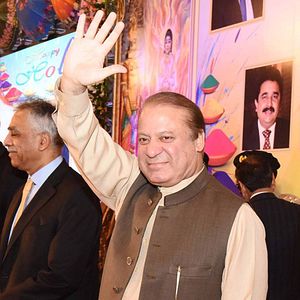On Monday, the Lahore High Court barred all Pakistani TV channels from airing any speeches of the ruling Pakistan Muslim League-Nawaz (PML-N) party’s leadership, which allegedly targeted the country’s top judiciary.
The decision comes in the wake of the Supreme Court of Pakistan’s historic verdict recently that banned Nawaz Sharif, the founder of the PML-N, and the former prime minister of Pakistan, from politics for life.
The apparent isolation of the ruling party ahead of the next general election indicates that the former prime minister should not expect an easy election when major state institutions are explicitly bent on ruining the PML-N’s political future. There are three main challenges that the party needs to focus on if it’s interested in winning the upcoming general election.
First, the party needs to tone down its anti-military and anti-judiciary rhetoric. The approach of targeting the military as well as the top judiciary to attract public support has actually backfired.
Sharif, who was ousted from the premiership over corruption allegations last year, has not been able to build public support for his year-long campaign aimed at proving that the court’s decision to disqualify him from office was politically motivated.
On the other hand, the military, which enjoys widespread public support in Pakistan, has cast Sharif’s efforts as an attempt to malign the country’s premier institutions. The military, which historically had the judiciary’s constitutional support in leveraging its power against civilian politicians in Pakistan, has openly vowed to support the Supreme Court of Pakistan in case its institutional legitimacy is challenged by the country’s civilian elite.
This has not only offered credence to the judiciary’s controversial verdicts and recent assertiveness, but has also emboldened it further, offering the institution more space beyond its constitutional legitimacy. With the military and the judiciary increasingly flexing their power over the elected government, the ruling party cannot afford active hostility going into the next general election.
Second, Sharif needs to ensure that his political party doesn’t lose the support of its core electorate in Punjab, the province that forms the party’s overall electoral strength nationally and at the federal level.
Increasingly, for the ruling party, the worries in this regard are genuine: last week, a number of lawmakers from Sharif’s party tendered resignations and announced they would oppose the party in the upcoming general election.
This has created a perilous precedent for the ruling party. With the incoming general election only weeks away, the defections of electable candidates only send one message to opportunistic politicians: now is the time to jump ship, for staying with the ruling party only means staying with the losing party.
The perception of the ruling party’s growing isolation adds pressure on candidates who are a part of the PML-N government, for they don’t want to end up staying with a losing party after the next general election is over.
This by far presents the biggest challenge to the ruling party as far as the next general election is concerned. The ruling party’s leadership needs to come up with a solid plan to manage growing perceptions regarding its isolation. If the ruling party is able to successfully convince it’s candidates that Sharif is still in a position to win the next general election, the party may very well win the election.
Third and finally, Sharif needs a solid narrative, one that neither targets major state institutions for electoral gains and nor asks for a sympathy vote due to some recent controversial institutional decisions that may have weakened him politically, particularly his own banning from politics for life.
Following the current electoral course, which only invites institutional confrontation, is not likely to help Sharif’s party in winning at the polls. Sharif should find his electoral agenda in his government’s performance and deliverability on major political promises made during the general election of 2013.
There are a number of issues that Sharif’s party can boast about in terms of its next electoral agenda: the improved security situation, reduced energy crisis, and the sustained revival of the economy are some issues that the government can take credit for.
As of now, Sharif’s party is in a complicated situation politically. If there is any covert institutional resistance to Sharif’s politics, it will only expedite as the country gets closer to the election. Unless the ruling party’s leadership alters its current political approach which only invites institutional confrontation, Sharif may not have a party after the next general election.






























